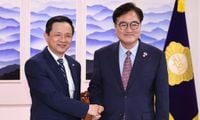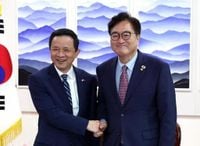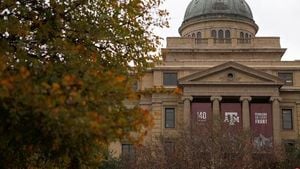In a week marked by diplomatic maneuvering and historic gestures, South Korea and China have found themselves at the center of two intertwined anniversaries—one commemorating the end of World War II, the other addressing a wound dating back nearly eight decades on the Korean Peninsula. Both events, scheduled for September 3, 2025, have drawn international attention, not just for their symbolism, but for the delicate balancing act they represent in Northeast Asian politics.
On August 20, 2025, South Korea’s Ministry of Unification made a significant announcement: North Korea has officially accepted a public apology from the South regarding the so-called ‘Jeon Sung-jeop incident,’ a matter that has festered since 1945. According to KBS, the apology will be delivered during the North Korea Peace and Reconciliation event at the Pyongyang Cheonan Assembly Hall, a venue loaded with political significance. Details of the apology remain undisclosed, but the Ministry has committed to responding publicly after a thorough review. The acceptance marks a potential turning point in inter-Korean relations, as North Korea has pressed for this apology for nearly 80 years, even seeking support from foreign governments to bolster its demand.
While the content of the apology is still closely guarded, the Ministry of Unification has indicated that discussions will follow with relevant South Korean officials and the South-North Korean Unification Council. As reported by Hankyoreh, Kim Tae-nyeon and Park Jung-deul of the Democratic Party are leading the negotiation and follow-up meetings, underscoring the political weight attached to this reconciliation process. The Ministry also intends to keep government officials in the two North Korean provinces bordering the South informed, a move designed to ensure transparency and regional stability.
The backdrop to this apology is the broader context of the 80th anniversary of the end of World War II, a milestone that China is marking with an elaborate Victory Day celebration in Beijing’s Tiananmen Square. The event, known officially as the ‘Anniversary of the Victory in the Chinese People’s War of Resistance Against Japanese Aggression,’ is set to feature a massive military parade and the attendance of dignitaries from across the globe. According to Ilyo Sinmun, the Chinese government initially sought the presence of South Korean President Lee Jae-myung. However, with President Lee’s attendance deemed unlikely, the official invitation was extended to Woo Won-shik, Speaker of the South Korean National Assembly—a move that carries its own diplomatic signals.
On August 20, Woo met with Chinese Ambassador to South Korea Dai Bing at the National Assembly in Seoul, where the invitation was formally conveyed. The National Assembly’s press office stated, “Speaker Woo has received an official invitation from the Chinese government to attend the Victory Day event on September 3. We will announce his decision once it has been made.” As of now, Woo’s participation is not confirmed, but sources from Yonhap News and News Tomato suggest he is likely to attend, possibly accompanied by a bipartisan delegation of lawmakers from the Korea-China Parliamentarians’ Friendship Association, including Kim Tae-nyeon, Park Jung-deul, and Kim Sung-won.
China’s approach to this year’s commemoration is grander than ever, reflecting both the 80th anniversary and a desire to reinforce its diplomatic ties in the region. The event is expected to draw tens of thousands to central Beijing, with a military parade that will underscore China’s growing influence. The scale of the celebration also recalls the 70th anniversary in 2015, when then-President Park Geun-hye attended, signaling a high point in Sino-Korean relations at the time.
Amid these preparations, China has reiterated its commitment to the ‘One China’ policy, especially as the United States and South Korea prepare for their own summit on August 25. According to Hankyoreh, Chinese Ambassador Dai Bing underscored the importance of maintaining the original intent of diplomatic normalization between China and South Korea, which dates back to 1992. Dai’s message, posted on social media alongside a visit to the tomb of former South Korean President Roh Tae-woo, read: “China hopes to uphold the spirit of diplomatic ties with Korea, firmly pursue good neighborly friendship, and strive for mutual benefit and co-prosperity, so that China-Korea relations can continuously reach new heights.”
The timing of these gestures is no accident. With the United States reportedly urging South Korea to play a more active role in any potential Taiwan crisis, China’s emphasis on the ‘One China’ principle is a clear reminder of the diplomatic commitments made at the time of normalization. The 1992 joint communiqué explicitly stated, “The government of the Republic of Korea recognizes the government of the People’s Republic of China as the sole legal government of China and respects the position that there is only one China and that Taiwan is a part of China.”
For South Korea, the decision of who will represent the country at the Beijing event is more than a matter of protocol. By sending Speaker Woo instead of President Lee, Seoul signals respect for China’s invitation while also maintaining a careful distance amid shifting regional dynamics. Should Woo attend, he is expected to be accompanied by lawmakers from both the ruling and opposition parties, highlighting a bipartisan approach to foreign policy at a time when unity is at a premium.
Meanwhile, the apology to North Korea—though less publicized in the international press—may prove equally consequential. North Korea’s demand for a public apology has been a persistent feature of inter-Korean relations, with the ‘Jeon Sung-jeop incident’ serving as a symbol of unresolved historical grievances. The fact that the apology will be delivered on the same day as China’s Victory Day celebration is more than mere coincidence; it reflects the interconnectedness of historical memory and present-day diplomacy in Northeast Asia.
While many details remain to be clarified—including the precise content of the apology and the final composition of the South Korean delegation to Beijing—what is clear is that September 3, 2025, will be a day of both remembrance and recalibration for the region. As the Ministry of Unification put it, “We will respond accordingly after reviewing the details of the apology.” That sense of cautious optimism, tempered by decades of history, seems to capture the spirit of the moment.
With both Seoul and Pyongyang preparing for a symbolic exchange and Beijing hosting one of its largest diplomatic gatherings in years, the world will be watching to see whether these gestures lead to lasting change or simply mark another chapter in the long, complicated history of Northeast Asia.





